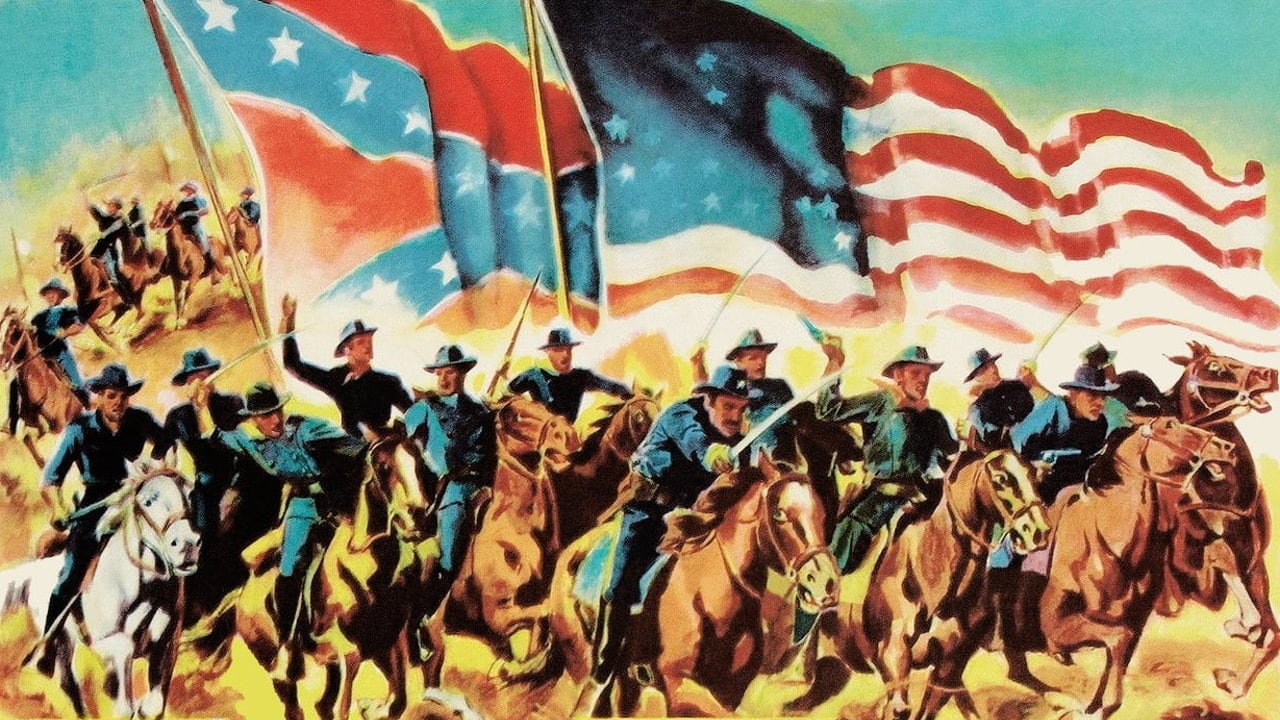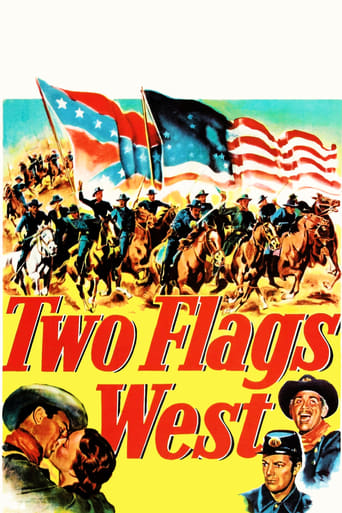Cathardincu
Surprisingly incoherent and boring
Huievest
Instead, you get a movie that's enjoyable enough, but leaves you feeling like it could have been much, much more.
AutCuddly
Great movie! If you want to be entertained and have a few good laughs, see this movie. The music is also very good,
Bergorks
If you like to be scared, if you like to laugh, and if you like to learn a thing or two at the movies, this absolutely cannot be missed.
zardoz-13
"The Day the Earth Stood Still" director Robert Wise helmed only two westerns during his long career in Hollywood. The first was a Robert Mitchum oater, and the second was the Civil War western Two Flags West. Movies about the American Civil War out west usually dealt with the Confederates trying to commandeer gold for the Lost Cause. Two Flags West qualifies as one of the best simply because it doesn't rely on a contrived plot. Instead, there is a lot of historical accuracy. The premise in Casey Robinson's screenplay based on a story by Curtis Kenyon and Frank Nugent concerns Southern prisoners-of-war who are released from prison camps on the condition that they don Union blue and fight hostile Native Americans. Despite its having been made before the advent of Cinemascope, "Two Flags West" is a pictorially elegant, black & white masterpiece of composition. A panning shot early on of the desert with Union cavalry riding through the austere terrain pulls back to reveal Indians atop mountains observing the troops. Indeed, this panoramic image is straight out of a John Ford western. In 1863 we are told that Abraham Lincoln offered Confederate soldier the chance to take an oath to the Union and be allowed to put on Yankee uniforms. Union officer Captain Mark Bradford (Cornel Wilde) puts the offer to Southern Colonel Clay Tucker (Joseph Cotton of "The Hellbenders") and he lets his imprisoned men made their decision. Naturally, they don't like the deal, but they abhor prison, so Tucker takes a demotion to Second Lieutenant and his men join him. Once they arrive at the fort, fort commandant Major Henry Kenniston (Jeff Chandler of "Broken Arrow") doesn't trust Tucker and his rebels. Moreover, he expects them to defect. Kenniston is a grim character. He is lame and jealous of his brother whose wife, Elena Kenniston (Linda Darnell of "My Darling Clementine") sulks because she wants to go to California and rejoin her family, but Kenniston refuses to let her out of his sight. Eventually, when Kenniston assigns Tucker and his troops to provide an escort for a wagon train, Elena persuades a minister and his wife to let her hide in their wagon. During the journey, Tucker learns about her presence. At the same time, a Confederate spy masquerading as a Union agent confides in Tucker that he can serve the South best by refusing to desert and staying with Kenniston. Kenniston is convinced that Tucker and his men will desert, but Tucker surprises him by not only returning but also bringing back Elena. Meantime, while Tucker is out on patrol trying to locate mysterious wagon trains, Kennison goes berserk and murders the son of an Indian chief and the tribe surrounds the fort. Tucker learns about Kennison's misfortune and decides not to desert but ride to Kennison's aid. "Two Flags West" boasts a strong cast. Joseph Cotton is at his virile zenith with Jeff Chandler delivering a commanding performance as the paranoid Kennison. Cornel Wilde, Dale Robertson, Arthur Hunnicutt, and Noah Beery Jr., round out the cast. If you enjoy Civil War westerns, "Two Flags West" should be on your not-to-be-missed list.
Michael Morrison
Not often do we get this kind of "all-star" cast and far too rarely do we get this much talent in one movie.There is no need to name the stars here -- but it is a pleasure just to look at the list here at IMDb -- however it is worth repeating they are huge talents.The premise, of Confederate soldiers, prisoners of war, enlisted to fight "Indians" on the Western frontier, has been used several times, and at least once ("The Last Outpost") Confederate regulars joined with Yankee troops to battle the tribes.Paraphrasing -- badly -- Franklin D. Roosevelt, "I hate war films," and I hate the premise that progress comes because of war. I hate the phony premise that war brings glory. Actually, this is a more accurate observation: "War--after all, what is it that the people get? Why--widows, taxes, wooden legs and debt." ~Samuel B. PettengillSo, the death and destruction do not appeal to me as entertainment, but I still admire the high production values and, again, the astonishingly talented cast.I thank the Encore network for presenting this and urge everyone who can to see it.
JohnHowardReid
Superbly photographed by ace cinematographer Leon Shamroy, and directed by Robert Wise with far more style than he was later to invest on The Sound of Music, this A-grade western seems to be largely forgotten, even by connoisseurs. True, the movie doesn't have what you would call an alluring 2013 cast. Joseph Cotten is first-billed, but the fans who flocked to see Joseph Cotten in Citizen Kane, The Third Man and Niagara were actually far more interested in Orson Welles or Marilyn Monroe (and were mightily encouraged to think that way by the advertising blitz that heavily promoted Welles or Marilyn and left Cotten in the dark. I remember Henry Hathaway once remarked that as far as audiences were concerned, Cotten was such a lightweight that he made little or no impression at all). Third-billed Linda Darnell made a terrific impact in Fallen Angel (1946) and then rose to fame in the title role of Forever Amber (1947). Although she was by far the most interesting wife in A Letter to Three Wives (1948), her career slipped. On the other hand, Jeff Chandler, Cornel Wilde, Dale Robertson and even Jay C. Flippen were on the way up. Indeed all the players here fit into their roles like the proverbial gloves. Production values also leave nothing to be desired, and, as noted above, Robert Wise's always stylish direction provides some really magnificent moments, including a compelling, full-of-action climax. The screenplay was written by Casey Robinson, who also produced. Frank S. Nugent and Curtis Kenyon wrote the original screen story which they based on a December 8, 1863 proclamation by President Abraham Lincoln which permitted Southern POWs to swear allegiance to the Union, thereby restoring their citizenship and right to own property (except slaves, of course). Over 6,000 Confederate prisoners obtained their freedom by joining the Union army to fight the Indians in the west – it being tacitly agreed that they would never be asked to turn their arms against the South. The film was released in New York at the Rivoli on 12 October 1950. U.K. release date was 4 December 1950.
NewEnglandPat
This gritty western is a post-Civil War affair set in New Mexico where soldiers of the Blue and the Gray are obliged to let bygones be bygones and tame the wild frontier for westward expansion. The usual antagonisms are present in abundance, with Union officers reluctant to trust the Confederate troops and question their allegiance to the United States. A top cast is headed by Joseph Cotten and Jeff Chandler, who constantly spar with each other about men, munitions and how to meet the Indian threat. Linda Darnell is the lone femme in the cast and her presence sparks romantic interest and jealousy in equal measure at the army post. The Yank-Rebel forces manage to put their bickering aside to defend against an Indian attack that remains one of the best ever filmed. The black and white lensing is good and enhances director Robert Wise's fine film.

